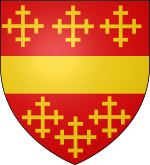
Thomas de Beauchamp, 12th Earl of Warwick
Encyclopedia

Order of the Garter
The Most Noble Order of the Garter, founded in 1348, is the highest order of chivalry, or knighthood, existing in England. The order is dedicated to the image and arms of St...
(16 March 1338/1339 – 1401) was an English
England
England is a country that is part of the United Kingdom. It shares land borders with Scotland to the north and Wales to the west; the Irish Sea is to the north west, the Celtic Sea to the south west, with the North Sea to the east and the English Channel to the south separating it from continental...
medieval nobleman, and one of the primary opponents of Richard II
Richard II of England
Richard II was King of England, a member of the House of Plantagenet and the last of its main-line kings. He ruled from 1377 until he was deposed in 1399. Richard was a son of Edward, the Black Prince, and was born during the reign of his grandfather, Edward III...
.
Birth and Marriage
He was the son of Thomas de Beauchamp, 11th Earl of WarwickThomas de Beauchamp, 11th Earl of Warwick
Thomas de Beauchamp, 11th Earl of Warwick, KG was an English nobleman and military commander during the Hundred Years' War...
and Katherine Mortimer, a daughter of Roger Mortimer, 1st Earl of March, and succeeded his father in 1369. He married Margaret Ferrers, daughter of Sir William Ferrers, 3rd Baron Ferrers of Groby
Baron Ferrers of Groby
The peerage title Baron Ferrers of Groby was created in the Peerage of England in 1300 when William Ferrers, 1st Baron Ferrers of Groby was summoned to parliament. He was a grandson of William de Ferrers, 5th Earl of Derby. In 1475 the eighth baron was created the Marquess of Dorset, with which...
and Margaret d'Ufford, daughter of Robert d'Ufford, 1st Earl of Suffolk
Robert d'Ufford, 1st Earl of Suffolk
Robert d'Ufford, 1st Earl of Suffolk, KG was born in Thurston, Suffolk, England to Robert d'Ufford and Cecily de Valoines. On 13 November 1334 he married Margaret de Norwich, daughter of Sir Walter Norwich and Catherine de Hedersete. They had four children. He was made Earl of Suffolk in...
.
Royal Service
The Earl accompanied John of Gaunt in campaigns in France in 1373, and around that time was made a Knight of the Garter. In the parliaments of 1376 and 1377 he was one of those appointed to supervise reform of King Richard II's government. When these were not as effective as hoped, Beauchamp was made Governor over the King. He brought a large contingent of soldiers and archers to King Richard's Scottish campaign of 1385.Conflict with King Richard II
In 1387 he was one of the Lords AppellantLords Appellant
The Lords Appellant were a group of nobles in the reign of King Richard II who sought to impeach some five of the King's favourites in order to restrain what was seen as tyrannical and capricious rule. The word appellant simply means '[one who is] appealing [in a legal sense]'...
, who endeavored to separate Richard from his favorites. After Richard regained power, Beauchamp retired to his estates, but was charged with high treason in 1397, supposedly as a part of the Earl of Arundel
Earl of Arundel
The title Earl of Arundel is the oldest extant Earldom and perhaps the oldest extant title in the Peerage of England. It is currently held by the Duke of Norfolk, and is used by his heir apparent as a courtesy title. It was created in 1138 for the Norman baron Sir William d'Aubigny...
's alleged conspiracy. He was imprisoned in the Tower of London
Tower of London
Her Majesty's Royal Palace and Fortress, more commonly known as the Tower of London, is a historic castle on the north bank of the River Thames in central London, England. It lies within the London Borough of Tower Hamlets, separated from the eastern edge of the City of London by the open space...
(in what is now known as the "Beauchamp Tower"), pleaded guilty and threw himself on the mercy of the king. He forfeited his estates and titles, and was sentenced to life imprisonment on the Isle of Man
Isle of Man
The Isle of Man , otherwise known simply as Mann , is a self-governing British Crown Dependency, located in the Irish Sea between the islands of Great Britain and Ireland, within the British Isles. The head of state is Queen Elizabeth II, who holds the title of Lord of Mann. The Lord of Mann is...
. The next year, however, he was moved back to the Tower, until he was released in August 1399 after Henry Bolingbroke's initial victories over King Richard II.
Restored by Bolingbroke
After Bolingbroke deposed Richard and became king as Henry IVHenry IV of England
Henry IV was King of England and Lord of Ireland . He was the ninth King of England of the House of Plantagenet and also asserted his grandfather's claim to the title King of France. He was born at Bolingbroke Castle in Lincolnshire, hence his other name, Henry Bolingbroke...
, Beauchamp was restored to his titles and estates. He was one of those who urged the new King to execute Richard, and accompanied King Henry against the rebellion of 1400.

